Chart in Focus
Active Management
Texas Roadhouse CEO Kent Taylor is passionate about lettuce. Deeply passionate.
"I remember meeting with him to get to know his strategy, and I mentioned a competitor," recalls Greg Wendt, an equity portfolio manager who began investing in the company about 10 years ago. "Kent got very worked up, and said, ‘Do you know how they treat lettuce? They put it in big bins. Do you know what that does to lettuce? It compresses and gets mushy. We do stacked small tins. It takes more time, but our lettuce is crisp and fresh.’ "
What does lettuce have to do with investing? Wendt found Taylor to be an inspired leader with a firm command of every detail of his company’s operations.
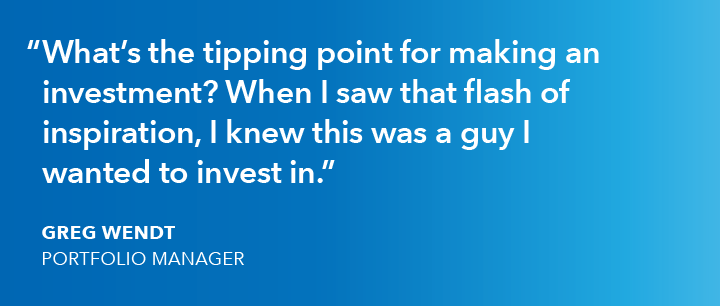
"What’s the tipping point for making an investment?" Wendt asks. "When I saw that flash of inspiration, I knew this was a guy I wanted to invest in. And today he continues to run the company with the same laser-focus on the customer experience."
A recipe for success
Capital Group’s investment professionals base their investment decisions on a deep conviction in a company’s long-term business prospects. These convictions are built over time through extensive research of a company’s balance sheet, cash flows, addressable market and competitive moat. The numbers are important. But there is another essential ingredient for investment success: a superior management team.
"The most important lesson I’ve learned over the years is that management really does matter a lot to the ultimate success of the company," says Claudia Huntington, an equity portfolio manager with more than 45 years of investment experience. "The odds that a great company run by a poor CEO will be a good investment are low. There is a much better likelihood, in my view, that a so-so company with a superb CEO could turn out to be a very good investment. Great management can make all the difference."
To be sure, not all investment decision made by our investment professionals have been successful, but very often success and exceptional executives have gone hand in hand.
Evaluating a CEO is not an exact science. It is more an art based on judgment honed through deep experience. But hiring the wrong executive can result in real costs to companies and their shareholders.
Forced CEO departures — those that are not a planned succession or resulting from M&A — cost investors $112 billion a year in value, according to a 2015 survey by consultant PwC that looked at CEO turnover at the world’s 2,500 largest public companies.* CEOs often are fired because the value of the company has declined during the executive's tenure, presumably due in part to management decisions. Median total shareholder return drops to -13% at these companies in the year leading up to the turnover.
Here’s a picture of four types of executives that our investment team has encountered.
1. The culture champion
Searching for the headquarters of Precision Castparts in Portland, Ore., can make you feel a lot like Indiana Jones navigating the streets of Cairo in search of the Lost Ark. On her first visit in 1999, Huntington remembers jumping in a cab at the airport and giving the driver the address. Forty-five minutes later, they were still wandering around a nondescript Portland neighborhood. Eventually, they found the manufacturer of specialty metals for the aerospace and defense industries on the third floor of a small unmarked industrial building next to a gravel parking lot down a dirt road. Suffice to say, this company wasn’t splurging on a gleaming new headquarters.
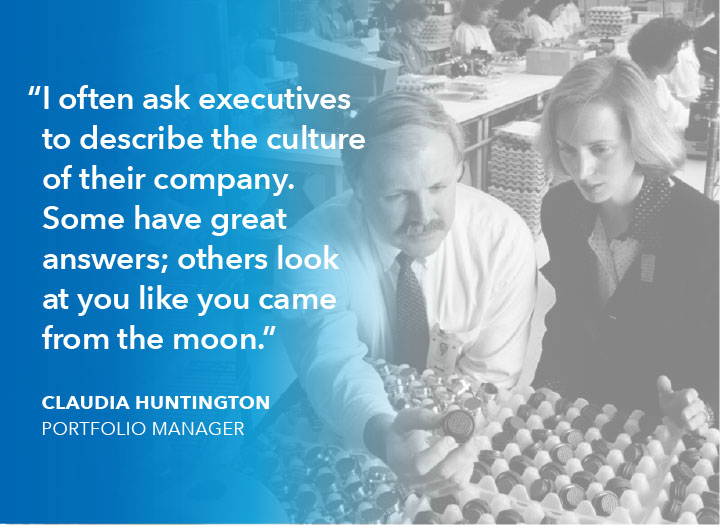
The trip turned out to be very worthwhile for Huntington. She was pleased to learn that CEO Mark Donegan was a detail-oriented leader with a laser focus on productivity. "He had a stack of reports on his desk, which he read regularly so he could help his managers solve problems at their factories," Huntington explains.
She walked away from the meeting feeling confident that Donegan could grow the business with high productivity and high quality.
But what Huntington liked most was the culture that Donegan had fostered. "The best companies are often the ones with a very strong culture," she says. "I often ask executives to describe the culture of their company. Some have great answers; others look at you like you came from the moon."
One Christmas Eve, a factory manager called Donegan because the line was down and he wasn’t sure how to fix the problem. Donegan took the next flight out to help the guy. "He’s got a culture that allows his factory managers to call him on Christmas Eve," Huntington says. "Now the company certainly was hierarchical, but he had developed a culture where everybody believed they were in it together to do the right thing."
Huntington ultimately held an investment in Precision for about 15 years, until Berkshire Hathaway acquired it.
2. The humble servant
On paper, Frank Blake — a Harvard-educated lawyer with no retail experience and limited charisma — did not seem to be the right guy to lead a much-needed turnaround at Home Depot. When he was named CEO in 2007, the home improvement retailer was suffering from declining same-store sales, operational inefficiency and low morale. Anne-Marie Peterson, a portfolio manager who has covered retail companies for more than 20 years, went into her first meeting with Blake with a bias that he would not be able to draw up the right blueprint the revive the company.
But what she learned in that first meeting surprised her. She found Blake to be soft-spoken and humble to a fault, but possessed simple yet powerful insights into the business and what was needed to unlock its potential. "It seemed like he had studied the company’s problems from every angle before setting a plan," Peterson recalls. "He quickly came to understand the retail industry better than most long-time retail CEOs."
In contrast to his predecessor, a numbers guy, Blake put his focus on people — the company’s customers and employees. He changed Home Depot’s leadership model, shifting the focus toward employees at the sites, boosting the bonus system and placing greater emphasis on customer service. He frequently made unannounced visits to stores and regularly read an often-critical employee blog. His deep humility helped him earn the trust of his management team.
"He is open about mistakes, is a great listener and seems approachable," Peterson says. "If I worked for him I wouldn’t be afraid to tell him something he might not want to hear. He seemed to really want the truth."
Home Depot’s profitability rebounded under Blake, who retired in 2014. It was the culmination of several meetings over a long time that made Peterson a true believer.
"I visited him multiple times in that year, met with various team members to get comfortable with his plans and challenged him by asking difficult questions on a number of topics," she says. "He knew what needed to be done because he wasn’t an insider. Plus, he had assembled the right team and earned the trust and loyalty of his team. This job is about generating insights that are underappreciated by the market. That was the insight the market was missing, that this was the right guy for the job after all."
3. The back-to-basics leader
In 2012, British drugmaker AstraZeneca’s research and development pipeline was on life-support. After a series of failed drug trials and compliance issues, the company’s management had become risk-averse, with scientific research subordinated to commercial considerations, recalls Eric Keisman, an investment analyst with more than 11 years of experience covering pharmaceutical companies.
Companies that are first to market with therapies have a huge competitive advantage. So when Pascal Soriot was named CEO in August, he immediately set out the give AstraZeneca’s sickly R&D department a much-needed shot in the arm.
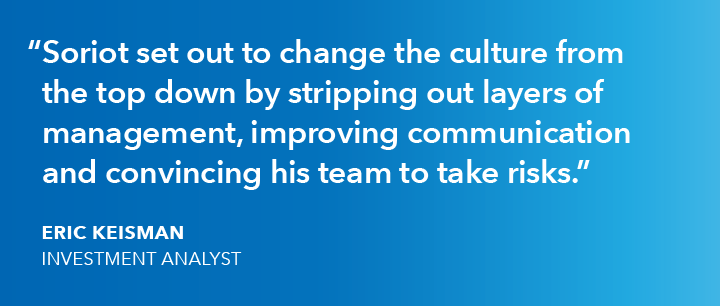
"To do this, Soriot set out to change the culture from the top down by stripping out layers of management, improving communication and convincing his team to take risks," Keisman says. "When I asked him in 2013 why he would stake his reputation on Brilinta, a heart drug that had a shaky launch due to a questionable trial, he said that if he hedged his bets, others will recognize that and hedge their bets too, and the product will fail."
Brilinta recently surpassed $1 billion in sales.
Keisman came away from an early meeting with Soriot believing him to be frank, humble and very thoughtful about the psychology of what makes an organization work. Soriot’s efforts to rebuild Astra’s pipeline have already led to new therapies in oncology, including a treatment for lung cancer called Tagrisso. The company also has had success with drugs for treating asthma and diabetes and is conducting trials on a host of other potential cancer therapies in its pipeline.
"There is still a long road ahead for the recovery of AstraZeneca’s pipeline," Keisman says.
4. The visionary leader
Greg Wendt has spent much of his career looking to invest with successful management teams. One chief executive from whom Wendt learned a lot about how to understand a management team was John Amerman, CEO of toymaker Mattel from 1987 to 1997. "John was an extraordinary leader for that company and he taught me a lot about the best questions to ask management teams," Wendt recalls.
During one meeting, Wendt asked Amerman about his own guiding principles. Amerman took out of his wallet a laminated card featuring eight principles for running Mattel. Wendt recognized some of them from his discussions with Amerman over the years but was surprised by how simple they were. The one he remembers most clearly was the eighth: "This is a toy company. We are going to have fun."
While that may seem obvious, not every CEO who has led Mattel since Amerman’s departure has been as toy and product-focused. Wendt hung on to the card, which he has shared with several of Amerman’s successors over the years.
"They were amazed to see me pull this dog-eared card out of my wallet with Amerman’s eight principles on it," says Wendt, who has covered Mattel for more than 30 years. "Continuity of coverage can provide a significant advantage in evaluating management. At this point, I’ve covered Mattel longer than any of these CEOs have worked in the business."
Not just pieces of paper
To be sure, many meetings end with a decision to not invest. Years ago Huntington met with the CEO of a large Chicago company, thinking they might have some interesting technology. There was nothing on the executive’s desk except a pencil holder and some perfectly sharpened pencils, Huntington recalls. The CEO’s assistant interrupted the meeting three times with questions.
While attention to detail can be critically important at some organizations, it must be balanced with a big-picture vision, Huntington says. "I said to myself, ‘He’s a micro-manager and this company is too big to have a micro-manager as CEO.'"
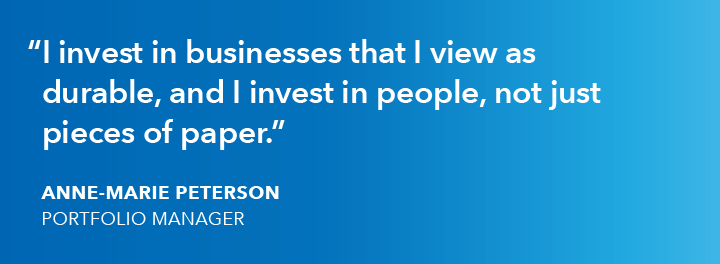
Had she not attended the meeting and had that interaction, Huntington might have invested in the company. "It looked attractive on paper," she recalls. Ultimately the stock declined significantly, the CEO was fired, and the company broke up because it was so mismanaged.
A common misconception about investing is that it is all about understanding the numbers and macroeconomic cycles. "There certainly are some people who do it that way," says Peterson, who focuses on the management — understanding who is capable, who has the right strategy, who connects well with employees and customers. "But that more qualitative judgment is my passion and how I spend the bulk of my time investing. I invest in businesses that I view as durable, and I invest in people, not just pieces of paper."
*"The $112 Billion CEO Succession Problem," strategy+business, PwC, April 2015.
Investing outside the United States involves risks, such as currency fluctuations, periods of illiquidity and price volatility, as more fully described in the prospectus. These risks may be heightened in connection with investments in developing countries.
Our latest insights
-
-
Economic Indicators
-
Demographics & Culture
-
Emerging Markets
-
RELATED INSIGHTS
-
-
Active Management
-
Monetary Policy
Never miss an insight
The Capital Ideas newsletter delivers weekly insights straight to your inbox.
Statements attributed to an individual represent the opinions of that individual as of the date published and do not necessarily reflect the opinions of Capital Group or its affiliates. This information is intended to highlight issues and should not be considered advice, an endorsement or a recommendation.
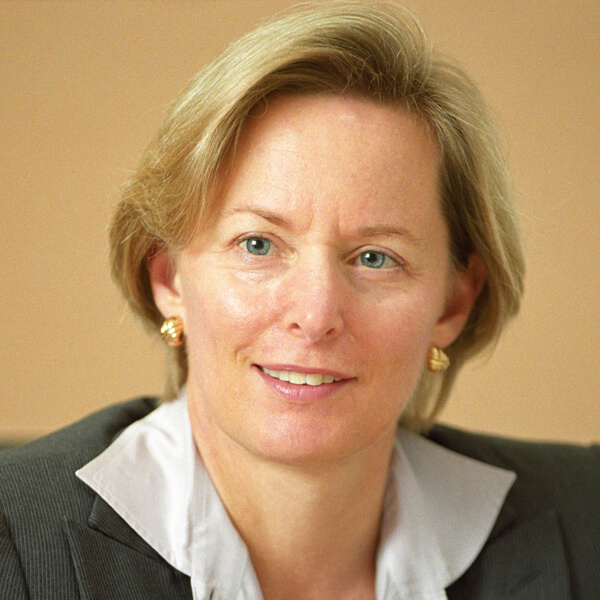 Claudia Huntington
Claudia Huntington
 Greg Wendt
Greg Wendt
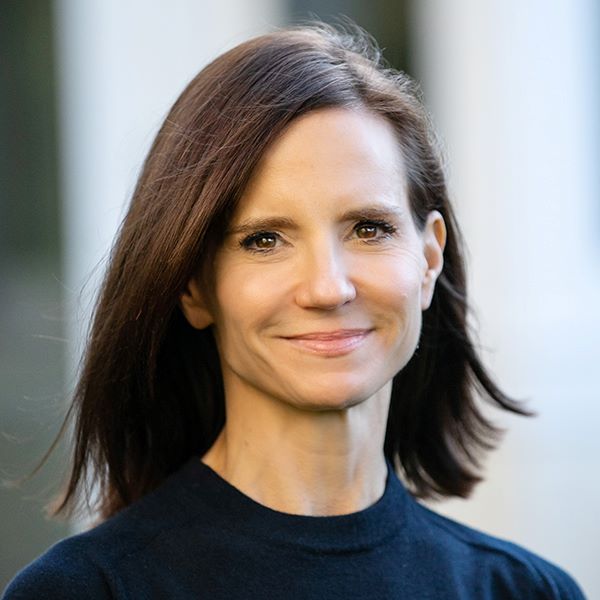 Anne-Marie Peterson
Anne-Marie Peterson